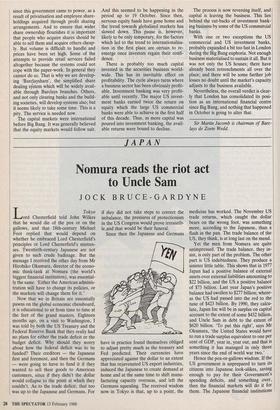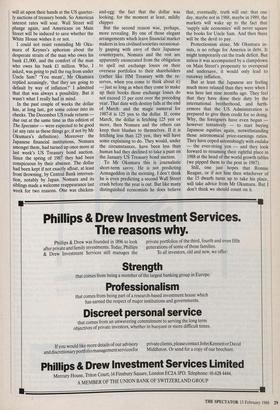JAPAN
Nomura reads the riot act to Uncle Sam
JOCK BRUCE-GARDYNE
Now that we in Britain are essentially pawns on the global economic chessboard, it is educational to sit from time to time at the feet of the grand masters. Eighteen months ago, on a visit to Washington, I was told by both the US Treasury and the Federal Reserve Bank that they really had no plans for either the trade deficit or the budget deficit. Why should they worry about how the federal deficit was to be funded? Their creditors — the Japanese first and foremost, and then the Germans — were going to have to fund it if they wanted to sell their goods to American customers, since if they didn't the dollar would collapse to the point at which they couldn't. As to the trade deficit, that too was up to the Japanese and Germans. For if they did not take steps to correct the imbalance, the pressures of protectionism in the US Congress would prove irresistib- le,and that would be their funeral.
Since then the Japanese and Germans have in practice found themselves obliged to adjust pretty much as the treasury and Fed predicted. Their currencies have appreciated against the dollar to an extent that has rejuvenated US export industries, induced the Japanese to create demand at home and at the same time to shift manu- facturing capacity overseas, and left the Germans squealing. The received wisdom now -in Tokyo is that, up to a point, the medicine has worked. The November US trade returns, which caught the dollar bears on the wrong foot, was something more, according to the Japanese, than a flash in the pan. The trade balance of the US, they think, is at long last on the mend.
Yet the men from Nomura are quite unimpressed. The trade balance, they in- sist, is only part of the problem. The other part is US indebtedness. They produce a sinister little table. This shows that in 1977 Japan had a positive balance of external assets over external liabilities amounting to $22 billion, and the US a positive balance of $73 billion. Last year Japan's positive balance had swollen to $277 billion; where- as the US had passed into the red to the tune of $423 billion. By 1990, they calcu- late, Japan Inc will be in surplus on capital account to the extent of some $432 billion, and Uncle Sam in debt to the extent of $620 billion. `To put this right', says Mr Okumara, 'the United States would have to run a trade surplus equivalent to one per cent of GDP, year in, year out, and that is something it has managed in only three years since the end of world war two.'
Hence the pox-or-gallows wisdom. If the US government is unprepared to turn its citizens into Japanese look-alikes, saving enough to pay for their Government's spending deficits, and something over, then the financial markets will do it for them. The Japanese financial institutions will sit upon their hands at the US quarter- ly auctions of treasury bonds. So American interest rates will soar. Wall Street will plunge again, and Americans on Main Street will be induced to save whether the White House wishes it or not.
I could not resist reminding Mr Oku- mara of Keynes's aphorism about the desperate straits of the man who owes his bank £1,000, and the comfort of the man who owes his bank £1 million. Who, I asked, was going to pull the rug from under Uncle Sam? 'You mean', Mr Okumara replied accusingly, 'that they are going to default by way of inflation?' I admitted that that was always a possibility. But it wasn't what I really had in mind.
In the past couple of weeks the dollar has, at long last, got some colour into its cheeks. The December US trade returns due out at the same time as this edition of The Spectator — were expected to be good (at any rate as these things go; if not by Mr Okumara's definition). Moreover the Japanese financial institutions, Nomura amongst them, had turned up once more at last week's US Treasury bond auction. Since the spring of 1987 they had been conspicuous by their absence. The dollar had been kept if not exactly afloat, at least from 'drowning, by Central Bank interven- tion, notably by Japan. Nomura and its siblings made a welcome reappearance last week for two reasons. One was chicken- and-egg: the fact that the dollar was looking, for the moment at least, mildly chipper.
But the second reason was, perhaps, more revealing. By one of those elegant arrangements which leave financial market makers in less civilised societies occasional- ly gasping with envy of their Japanese counterparts, Nomura and the rest are apparently exonerated from the obligation to spell out exchange losses on their overseas portfolios to their shareholders (rather like HM Treasury with the re- serves, when you come to think about it) — just so long as when they come to make up their books those exchange losses do not exceed 15 per cent over the preceding year. That date with destiny falls at the end of March: and the magic numeral for 1987-8 is 125 yen to the dollar. If, come March, the dollar is fetching 125 yen or more, then Nomura and the others can keep their blushes to themselves. If it is fetching less than 125 yen, they will have some explaining to do. They would, under the circumstances, have been less than human had they declined to take a punt on the January US Treasury bond auction.
To Mr Okumara this is journalistic short-term savvy. He is not predicting Armageddon in the morning. I don't think he is even predicting a second Wall Street crash before the year is out. But like many distinguished economists he does believe that, eventually, truth will out: that one day, maybe not in 1988, maybe in 1989, the markets will wake up to the fact that `supply side economics' will never square the books for Uncle Sam. And then there will be the devil to pay.
Protectionism alone, Mr Okumara in- sists, is no refuge for America in debt. It might temporarily cut the trade deficit. But unless it was accompanied by a clampdown on Main Street's propensity to overspend and undersave, it would only lead to runaway inflation.
But at least the Japanese are feeling much more relaxed than they were when I was here last nine months ago. They feel that they have done their duty by the international brotherhood, and furth- ermore that the US Administration is prepared to give them credit for so doing. Why, the foreigners have even begun however tentatively — to start buying Japanese equities again, notwithstanding those astronomical price-earnings ratios. They have coped astonishingly with endaka — the ever-rising yen — and they look forward to resuming their rightful place in 1988 at the head of the world growth tables (we pipped them to the post in 1987). Still, one just hopes that Ronnie Reagan, or if not him then whichever of the 15 dwarfs turns up to take his place, will take advice from Mr Okumara. But I don't think we should count on it.



























































 Previous page
Previous page